- Home
- Elizabeth Gaskell
Some Passages From the History of the Chomley Family Page 2
Some Passages From the History of the Chomley Family Read online
Page 2
When his wife died she had left him with six children; and just about this time he married his eldest daughter, Margaret, “a very personable and beautiful woman,” to Mr. Strickland of Boynton, and his eldest son, Hugh, to Elizabeth, eldest daughter of Sir William Twisden of Peckham, in Kent. In the year 1624 he was made High Sheriff of the county; and not long afterwards, writs being issued for a new Parliament, Sir Thomas Wentworth and Sir John Savill stood to be Knights of the Shire for the county of York, and Sir Richard, being distantly related to Wentworth, declared himself for him, and did him all the favour he could. The expenses to which he was put on this occasion increased his debts to a sum “mysterious and incredible.” “All that can be said and imagined to account for it,” says Sir Hugh, “is that his carrying his family to London did not only put him out of his ordinary way of living, but drew him to an extraordinary charge.” Moreover, on account of the excessive cheapness of all goods about that time Sir Richard made little or nothing of those in his own hands. Besides Lord Scroope, affecting running horses had put him into a humour of breeding (which, observes Sir Hugh in a parenthesis, I have found to be vain and unprofitable), and which obliged him to keep two or three horses in constant training at several different places the year through. Then his shrievalty had been a great expense to him. But one of his greatest cankerworms was the interest he had to pay on borrowed moneys. It seems that he was also, like his grandfather, a great admirer of the fair sex; but, observes Sir Hugh, “I have heard him protest that it was not costly to him.”
As if this had not been enough, a cousin of Sir Richard's, one Mr. Gascoign, went to live in his house when he came to London. This gentleman being much addicted to the search after the philosopher's stone, Sir Richard also fell in love with it. Accordingly Gascoign not only got money out of him for these purposes, but Sir Hugh discovered among his father's papers a cancelled bond, binding him to pay one of the adepts in that profession £200 for a certain secret. Sir Richard was always very slow in acknowledging how much these occult studies had cost him, but it is certain the money he spent on them tended very greatly to the increase of his debts. “Strange and remarkable it is,” Sir Hugh philosophically observes, “that a man who had passed the greatest part of his life with the reputation of one of the ablest and wisest gentlemen of the country should now, at the age of forty-seven years, when commonly men's judgements are ripest and grown more sage by experience, not only be tempted into such a foppery and delusion, but even desire to intricate his eldest son therein too, for he would often try to persuade him to join him in his researches, and when the young man refused would remark he was so increduluous he should never be better for his studies.” Then his son would reply, “Sir, let me be no worse and I will never desire to be better.” There being now no other way to get rid of his debts, he made over to his eldest son the whole of his estate for ten years, reserving only £400 a year for himself to live on.
He died ultimately, at the age of sixty-two, of a surfeit of oysters. He was buried in the chancel of Whitby church, under the great blue stone where his grandmother had been laid twenty years before him.
Sir Richard was twice married. By his first wife--the beautiful Susanna Legard, who died in 1611 of a fever she had caught in going to see her son Hugh, who was ill at Scarborough-- he had four sons and two daughters. His second wife was Margaret Cob, with whom he had become acquainted and married during one of his visits to London. He was then about thirty-three years of age, and the lady some ten years his junior. Like her predecessor, she proved a loving dutiful wife, living many years at Whitby with her husband in great retirement, but with much content. She had four sons of her own, and was a good kind step-mother, bringing up her husband's two daughters with great tenderness, and when they died, grieving for them as if they had been her own children. On their part, they loved and honoured her as much as though she had been their own mother.
Having given an account of his ancestors and of his family, Sir Hugh begins his own autobiography. Being about to write the story of his own life, it puts him in mind, he says, of that fancy of the Emperor Charles V., when he would have the ceremony of his funeral procession performed upon himself while he was living. “Nor am I insensible,” he continues, with what difficulty and prejudice I undertake this work, considering when I am to mention my own blemishes and imperfections, the frailty of human nature is such I shall scarcely discern or rightly judge of them; and if I mention aught may be to my commendation or advantage, it will be thought pride or vain glory.” Accordingly, he requires his sons, if they know of any remarkable infirmities in him which he has not mentioned, that they should add it by way of a postscript to his biography. For the rest it is his desire to use as much truth and clearness as the frailty of human nature will permit.
Sir Hugh was the first child of his parents, his father being just twenty years of age when his son was born, at Roxby, on Mary Magdalen's Day, A.D. 1600. The little boy was unfortunate in his nurses, and for many years was but a weak ailing child. At three years old he also met with an accident which might have proved fatal. The maid who attended him let the child tumble out of the great chamber window at Roxby, and had it not been that in the act of falling he was espied and caught hold of by a servant who was waiting upon his grandfather at dinner in the room below, his life would have ended then and there. When he was but seven years old, his father and mother went to keep house at Whitby, and the little fellow accompanied them on horseback. He had just begun to ride a little way in advance with one of his father's servants beside him, when, on passing over a common called Paston Moor, he put his horse to a gallop. The animal running away, the child got alarmed and called out to the servant who, taking hold of his arm intending to lift him from his horse, let him fall to the ground. Fortunately, though one of the horses passed so near him as to tread on his hat, the little fellow escaped without hurt, as also did his mother, who in her fright had leaped off her horse. The following year, on the feast of St. Mary Magdalen, he was exposed to and escaped another great danger. It chanced that at his father's house there was a great fierce sow, which had two pigs about a quarter old. As the three were lying close together asleep near the kitchen door, young Master Hugh, out of folly and waggery, as he terms it, began to kick one of them. While he was doing so, the other got up, on which he fell to kicking them both to make them squeak. The sow hearing the cries of her young ones, rushed to the rescue, caught the young gentleman by the leg, and before he could recover himself, dragged him about twenty yards under the window of the larder. The three then began to bite him, and would soon have made an end of him had not the butler, who was carrying a glass of beer to his master, hearing him cry, set down the beer on the hall table, and running out snatched him away from the sow, who was just proceeding to attack her victim in the throat.
At eleven years of age Hugh was sent to the free school at Beverley, where he was attended by his usual ill fortune. Soon after he had gone there he took a fever which was prevalent there. Hearing of his illness, his cousin, Mrs. Hotham, sent for him to her house at Scarborough, where his mother going to see him caught the fever and died. The poor boy felt her loss greatly, for she had been a tender mother to him, and adds Sir Hugh, “I loved her dearly.” After the boy had been about two years at Beverley school, Mr. Petty, the head master, was chosen Fellow of Jesus College, Cambridge. He had, by that time, become so much attached to his pupil, as well as thinking him apt to learn, that he persuaded Hugh's father to let the boy accompany him to Cambridge, though he was then only just past thirteen years of age. Sir Richard gave consent, and he was entered as a fellow commoner. There being a youth there who some years before had been at Beverley school, Mr. Petty introduced him to young Chomley. But the acquaintance proved a very undesirable one: the young gentleman in question being a loose liver of questionable habits, and likely to ruin his companion as well as himself. Circumstances happily led to the breaking up of the set to which they belonged; and Hugh, though idle to the la
st, shook himself clear of dissipation.
He was seventeen years old when he finally left the university. He then spent a year in the country with his father, and became so fond of hunting, hawking, and horse races, that he could not easily put aside those pastimes, when he afterwards saw the vanity of them. On his going to London the following year, he was admitted a member of Gray's Inn, at the end of Michaelmas Term. But he totally neglected the study of the law during the whole of his three years' residence in the metropolis. After he had quitted the Inns of Court he took a lodging in Fleet-street, then a very fashionable part of London, and misspent his time more than ever, doing nothing but frequenting bowling-houses and gaming-houses. “Though for other extravagances, I was,” he says, “very temperate. So matters went on until he had arrived at the age of twenty-two, when he was married, at the church in Milk-street, to the daughter of Sir William Twisden. The wedding breakfast was held at Sir William's town house in Redcross-street, “which was so good a house,” says Sir Hugh, “as few gentlemen in town had the like, and bravely was it furnished.” There, in the year 1624, Mrs. Chomley presented her husband with a son and heir. The baby was as fair and fine a child, in its father's estimation, “as ever was born of a woman, and the instant after it came into the world looked broad with its eyes and as pert as if it had been a month old.”
Not quite two years after this event Mr. Chomley went to Yorkshire to make some arrangement for the payment of his father's debts, for which he had rendered himself responsible. It was finally settled that he should go over to France, where he would be out of the reach of the creditors. But when he was just on the eve of setting off, he received a passionate letter from his father, full of love and grief, begging him to return to Yorkshire, and speak with him. Mr. Chomley consequently altered his resolution, wherein, he says, he had cause to acknowledge God's good providence. For he soon saw his father could not have carried on any business without him, and that his going beyond the seas would have occasioned great disorder, if not ruin to the estates.
It was in the spring of this year 1626 that Sir Richard made the arrangement by which he leased his estates to his son for ten years. Mr. Chomley was consequently obliged to remain in Yorkshire, and take up his abode in the gate-house at Whitby. Meanwhile, his wife, who was still in London had been making preparations to rejoin her husband. Having been informed that it would be much more convenient to forward her goods by sea, she sent by water not only the household stuff and plate, but the whole of her wearing apparel, excepting what she had on her back, or in a small cloak bag. Unfortunately, the vessel was seized by a Dunkirker before it could make the port of Whitby; Mr. Chomley chanced, to have a suit of hangings in the gate-house and a bed for one chamber, so that they were not left utterly destitute. “Though it was a time of trouble,” says Mr. Chomley, “I have heard my dear wife often say she never lived with more content any part of her life; and though myself,” he adds, “had many hot businesses to perplex my head in the day, God gave me ability to lay all under my pillow at night, so that then they were no more trouble to me.”
The payment of his father's debts was indeed no trivial business which Mr. Chomley had set himself to perform. As for Sir William Twisden, he gave up his son-in-law for ruined, and would not stir a finger to assist him. Seeing this, other of his friends, with the exception of his cousin, Mr. Legard, and Sir John Hotham, stood aloof, so that at first he had no other resource than what was to be found in his own wits. However, through the blessing of God on his endeavours, by the end of the ten years he had either paid off the debts or given such security as fully contented the remaining creditors. On this affair being brought to a conclusion, he was able to say that it had neither prejudiced his health nor depressed his spirits. For he had ever, he said, carried in his mind, a speech of Sir Ralph Babthorp (a wise gentleman and his grandmother's brother) which was, “Not to be dejected for any troubles or crosses, for when a man's own heart fails him all the world forsakes him.”
In the midsummer of this year 1627 Mr. Chomley sent for his little boys, who had hitherto been staying at their grandfather's house in Kent. At that time Dick was just three years old, and Will a year and a half. The day they were expected, Mr. Chomley and his father rode out to meet them on the moors. Dick, who was a weak, tender child, took little notice of the gentleman, but drooped, and seemed tired with the journey; but Will, as soon as he saw Mr. Chomley at the coach-side, fell a whooping and hallooing, and staring at his father as if they had been well acquainted. At this, old Mr. George Conyers, who had travelled with them from the south, said, “Sir, you must be very indulgent, and take care of this eldest child, for he is very weak and tender. But if you turn this other on the moors, he will live and thrive there.” “Which I beseech the Lord he may, observed Sir Hugh, “they being fallen to his lot and portion by the death of his elder brother.” Two years after Dick had been brought to Yorkshire, the always ailing little fellow died.
“He was much fairer and more beautiful [says his father, lamenting his loss] than any other of my brood; for his hair was amber colour, his eyes grey, and his complexion as fair white and red as ever I saw. He died at the age of five years, yet had the courage and resolution of a man. For being to have an incision on a lump which rose on his right arm, he would say, “Father, would you have it done?” And when I made answer, “Yes, sweetheart; the doctor thinks it necessary;” then he would hold out his little arm without shrinking or whining. The same resolution he would show in taking medicine, which he could not endure.”
The following year Mr. and Mrs. Chomley had a daughter born to them, whom they named Elizabeth. But when she had reached her fourth year she fell suddenly sick, and died within a fortnight's time. “Then,” says Mr. Chomley, the Lord, who after the saddest and blackest storms causeth the sunbeams to break out and refresh all his creatures, was pleased to cheer up our hearts with the birth of our son Hugh.” Mrs. Chomley, after her recovery, was obliged to leave her home for a time. On her return an incident occurred which Sir Hugh thus relates:--
“My wife, longing to see her boy, whom she had left but two months old, being nursed near hand, at a place called Southward House, I gave orders the nurse should dress her own boy (but half a year older than mine) in my boy's coat, and to have him in her arms when my wife came into the house. And though the nurse's boy had grey eyes and mine black, I had told my dear wife they were grey, like my Dick's, which was dead, which she much desired; so that when she saw the nurse's boy she took it in her arms and kissed him, and seemed very well contented with him; till going into an inner parlour where the nurse's maid had our boy Hugh in her arms, as soon as ever my dear wife cast her eyes upon him she gave a start, and all her blood coming into her face, she said, “O Lord, sweetheart, this is my boy;” and running to him caught him in her arms and kissed him with much more fondness and earnestness than she did the other; though I, keeping a sober countenance, told her that was the nurse's boy. But she replied, “if I must have the other, I will have this too; for I am sure this is my own boy.” And in earnest, it was pretty and admirable to see how, by the instinct of nature, she had found out her own child.”
But she could never quite forgive the trick which had been played upon her. In long after years her son often heard her condemn this action of his father's, and say that the deceit put upon her from the nurse's child had bred such a fluctuation in her mind, that she could neither then willingly part with it, nor, for some time after, without a troublesome doubting be assured of her own.
In the spring of 1653, Mr. Chomley, now become Sir Hugh, removed with his family from Fyling Hall to the Gate House as Whitby, where he remained until his own house had been repaired, and rendered habitable. When it was fit to receive them, Lady Chomley, who was excellent at dressing and making all handsome within doors, put it into a “fine posture, and furnished it with so many good things, that there were few gentlemen in the country that had better.” Having, moreover, mastered his debts, Sir Hugh did not o
nly appear at all public meetings in a very gentlemanly equipage, but he also lived in as handsome and plentiful a fashion at home as any gentleman in all the country of his rank. He had between thirty and forty in his ordinary family: a chaplain, who said prayers every morning at six, and again before dinner and supper; a porter, who merely attended the gates, which were ever shut up before dinner, when the bell rung to prayers, and not opened till one o'clock, except for some strangers who came to dinner, which was always abundant enough for three or four besides the family, without any trouble; and whatever their fare was, they were sure to have a hearty welcome. Twice a week a certain number of old people, widows, and indigent persons, were also served at the gates with bread and pottage made of beef.

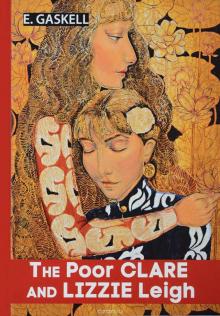 Lizzie Leigh
Lizzie Leigh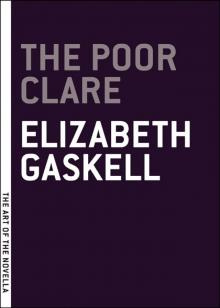 The Poor Clare
The Poor Clare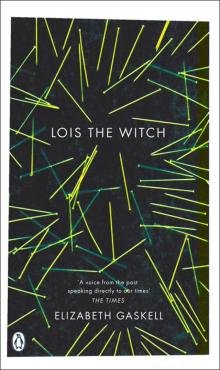 Lois the Witch
Lois the Witch North and South
North and South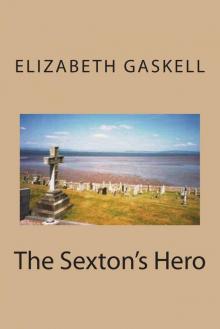 Sexton's Hero
Sexton's Hero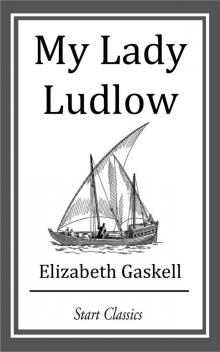 My Lady Ludlow
My Lady Ludlow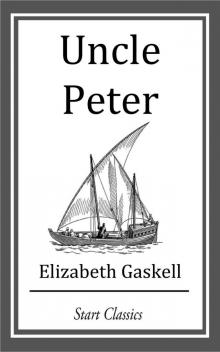 Uncle Peter
Uncle Peter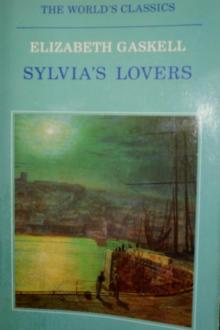 Sylvia's Lovers Elizabeth Cleghorn Gaskell
Sylvia's Lovers Elizabeth Cleghorn Gaskell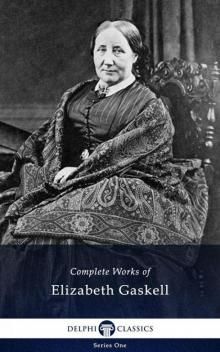 Delphi Complete Works of Elizabeth Gaskell
Delphi Complete Works of Elizabeth Gaskell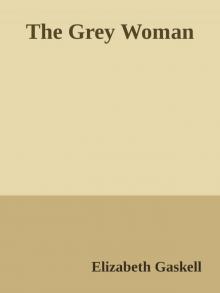 The Grey Woman
The Grey Woman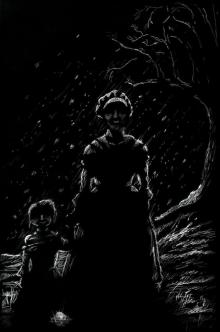 The Old Nurse's Story and Other Tales
The Old Nurse's Story and Other Tales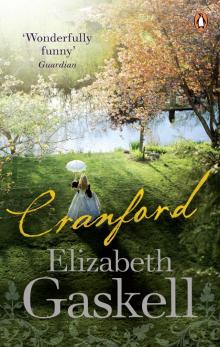 Cranford
Cranford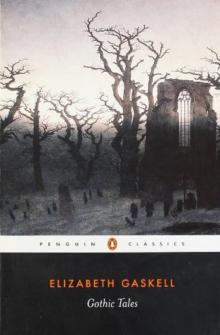 Gothic Tales
Gothic Tales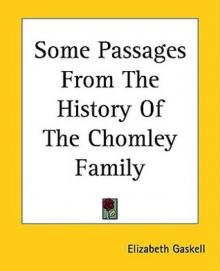 Some Passages From the History of the Chomley Family
Some Passages From the History of the Chomley Family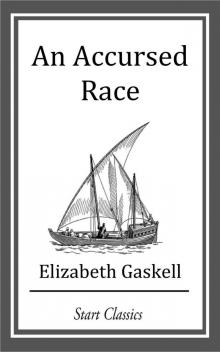 An Accursed Race
An Accursed Race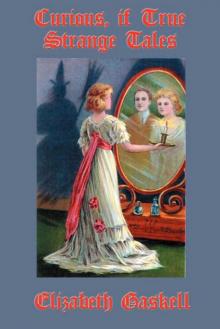 Curious, if True: Strange Tales Elizabeth Cleghorn Gaskell
Curious, if True: Strange Tales Elizabeth Cleghorn Gaskell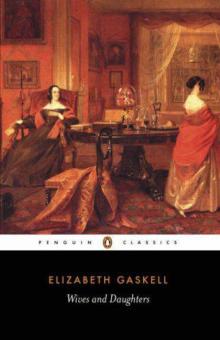 Wives and Daughters
Wives and Daughters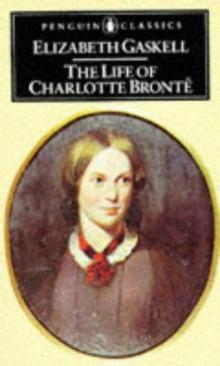 The life of Charlotte Brontë
The life of Charlotte Brontë